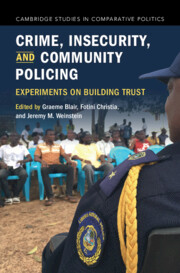Book contents
- Frontmatter
- Contents
- Contributors
- Acknowledgments
- Abbreviations
- Part I Crime, Insecurity, and Policing
- Part II The Effects of Community Policing
- 6 Meta-analysis of the Effects of Community Policing
- 7 Can Trust Be Built through Citizen Monitoring of Police Activity? Evidence from Santa Catarina, Brazil
- 8 Do Police–Community MeetingsWork? Experimental Evidence from Medellín, Colombia
- 9 Community Policing, Vigilantism, and the Rule of Law: Evidence from Liberia
- 10 Community Policing and Citizen Trust in Pakistan
- 11 Community Policing in the Philippines: Communication, Trust, and Service Provision
- 12 Restoring Police-Community Relations in Uganda
- Part III Reflecting on Community Policing
- References
- Index
- Series page
12 - Restoring Police-Community Relations in Uganda
from Part II - The Effects of Community Policing
Published online by Cambridge University Press: 09 December 2024
- Frontmatter
- Contents
- Contributors
- Acknowledgments
- Abbreviations
- Part I Crime, Insecurity, and Policing
- Part II The Effects of Community Policing
- 6 Meta-analysis of the Effects of Community Policing
- 7 Can Trust Be Built through Citizen Monitoring of Police Activity? Evidence from Santa Catarina, Brazil
- 8 Do Police–Community MeetingsWork? Experimental Evidence from Medellín, Colombia
- 9 Community Policing, Vigilantism, and the Rule of Law: Evidence from Liberia
- 10 Community Policing and Citizen Trust in Pakistan
- 11 Community Policing in the Philippines: Communication, Trust, and Service Provision
- 12 Restoring Police-Community Relations in Uganda
- Part III Reflecting on Community Policing
- References
- Index
- Series page
Summary
In this chapter, we test the efficacy of community policing in thirteen districts throughout rural Uganda. As in many authoritarian regimes, police in Uganda serve the dual role of providing security to citizens on the one hand and quelling dissent and opposition on behalf of the regime on the other. Community policing may help citizens delink the political arm of the police from less politicized local officers. The community policing initiative we study was locally designed and funded by the Ugandan police. Our evaluation combines administrative crime data from the Uganda Police Force with surveys of thousands of Ugandan citizens, local leaders, and police officers. While the initiative we study succeeded in increasing the frequency of interactions between citizens and the police in these far-flung villages and improved citizens’ understanding of the criminal justice system, we find no evidence that it reduced crime, enhanced perceptions of safety, improved attitudes towards the police, or strengthened norms of cooperation with the police. These results are consistent with other chapters in this volume and point to the potential limitations of community policing in low-income countries.
- Type
- Chapter
- Information
- Crime, Insecurity, and Community PolicingExperiments on Building Trust, pp. 439 - 482Publisher: Cambridge University PressPrint publication year: 2024

